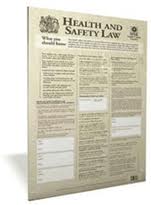Andy Trainer
2 May 2012
5 Benefits of Health and Safety Training
Meeting government requirements for Health and Safety, of course, has the ultimate goal of protecting your employees from harm. You would not want a workplace accident on your conscience, or to feel responsible for long-term effects from work on someone’s health.
Further to this, having staff trained in IOSH Managing Safely means reduced insurance premiums, enhanced local reputation, increased productivity, reduced absence, and protects you against legal costs – or even imprisonment!
Within the company, the role of managing health and safety usually falls to a manager or supervisor. It is vital that they undertake training in Health and Safety law and practices in order to fulfil this role and protect the rest of the staff.
Here's some more on those ways that following Health and Safety practices can benefit your business:

1. Reduced Insurance Premiums
Proving that you have managers who are trained in Health and Safety issues will reduce your insurance premiums because, of course, it means you are less likely to make a claim. Not only that, but the actions taken to prevent injury or illness will mean those premiums stay low because no claims are made.
2. Enhanced Reputation
Take this as an example: One in four call centre staff say they suffer problems with their throat and voice as a result of inadequate health and safety consideration. Not only is this going to increase costs in terms of covering their absences, it can severely impact the reputation of the business.
Imagine that a young call centre agent texts her mum to say she can’t speak to her on the phone as planned because of discomfort caused by her job. Her mum may tell a neighbour that she hasn’t spoken to her daughter for a while, the neighbour asks why, the mum tells a them that it’s because of her job at Company X – and they then chat about how irresponsible it is for that company to put their staff in that position. Word spreads from there and, very soon, people won’t want to buy your products or work for you.
Conversely, if an employee feels that they are looked after, they will tell people. You'll then have more competition for employment - and more people buying your products.
3. Increased Productivity
A staff member who experiences back, hand or wrist ache as a result of sitting at a computer may not always have the confidence or awareness to raise it as an issue. Instead, they may suffer in silence and work more slowly than usual, with more unofficial breaks to manage the pain.
A thorough health and safety audit by a trained manager will check for this sort of occurrence. Once identified, action will be taken to ensure this person is protected from this kind of injury and that they have the resources to be as productive as possible.
4. Reduced Absence
A manager who is trained in IOSH Health and Safety practices will be in a position to reduce illness and absence. For example, knowledge of allowed working temperatures and required washing facilities could prevent viruses spreading and causing sick leave.

5. Legal Protection Against Damages
With or without formal policy (which is a legal requirement of anywhere that employs more than five people), all companies must take reasonable steps to protect the health of their staff.
A business owner who is proven to have been negligent in protecting their staff against accident or illness can be held personally responsible; fined and even imprisoned. IOSH Managing Safely techniques will ensure that any minor incidents are documented and investigated, thus reducing the chance of injury and subsequent claims.
Workplace accident insurance will cover some types of claim in some circumstances but, even with insurance, you will always need to prove that reasonable preventative steps were taken. Insurance payouts often don't cover all costs involved in accidents, e.g. equipment repairs or to cover lost profits.
The cost and time spent on Health and Safety training and measures are tiny when compared to the potential damages from a workplace accident or work-related ill health.
